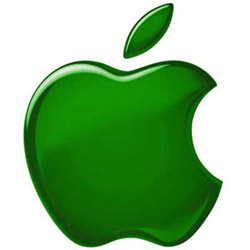Apple met with leaders of five environmental groups in China yesterday to discuss pollution concerns. According to a report from The Wall St. Journal, Apple told the groups it had launched audits of 15 of its suppliers who have been suspected of violating environmental regulations, and has completed reviews of 11 of those.
The details of the meeting were confirmed by Chinese green activist Ma Jun, who serves as the director of the Institute of Public & Environmental Affairs based in Beijing. Another environmental group director, Li Li of EnviroFriends, was also present at the meeting. Both leaders were relatively happy with the outcome of the discussions, as Apple was taking the right steps to address the issues at hand.
Mr. Ma told the WSJ that Apple had asked the companies accused of polluting to take corrective actions and give a timeline, but Ms. Li thought Apple could do more. Details on what she meant by that were not provided, however. Apple also said it would take environmental issues into consideration when it awarded future contracts, according to Mr. Ma.
Apple PR, in typical Apple fashion, declined to comment on the meeting.
Outside of the pollution concerns, one of the criticisms Mr. Ma had for Apple was its lack of transparency. He felt the company should name the suppliers under investigation and the suppliers themselves should have to disclose the steps they are taking. “Apple is trailing far behind in terms of transparency and pushing for the polluters to be held publicly accountable for their problems,” he said.
Apple’s annual supplier report for 2011, released in February, stated that Apple took corrective actions on 80 facilities that weren’t storing hazardous material properly and 41 that weren’t disposing of or recycling waste properly. But again, it didn’t list either the companies or the violations.
Lack of transparency is a common complaint from environmental organizations when it comes to Apple. For example, in Greenpeace’s 2011 Apple report card (Nov. 2011), the group notes that Apple’s Suppliers Code of Code of Conduct states that “suppliers shall comply with the most recent version of Apple’s Regulated Substances Specification, 069-015 and with any applicable laws and regulations prohibiting or restricting the use or handling of specific substances.”
But Greenpeace notes that’s it’s impossible to evaluate Apple’s communications with its supply chain on hazardous substances because Apple won’t disclose its Regulated Substances Specification.
Overall, Greenpeace gives Apple a 4.6 out of 10 across all its environmental sectors, including areas like energy use, green products and sustainable operations. Says Greenpeace, “Apple would score more points on the other criteria with greater transparency of its data in reporting the greenhouse gas emissions (GHG) of its supply chain and disclosure of the documents it uses to communicate with its supply chain for chemicals management.”
